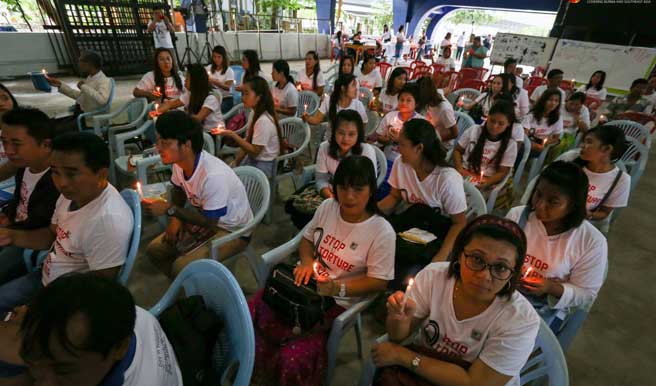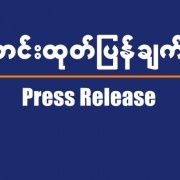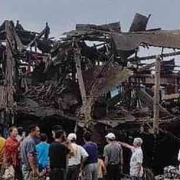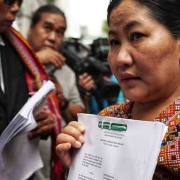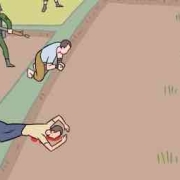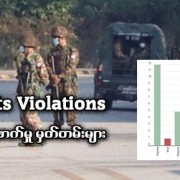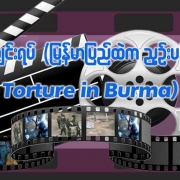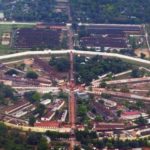Seeking justice in Burma (June 2018)
Seeking justice in Burma
June 2018
Pressure to hold perpetrators of mass human rights violations accountable continues to build; Kachin war commemorations banned and protesters charged; Panglong peace conference gets new date; defamation cases remain common despite reforms; high numbers of landmine fatalities in Shan and Kachin states.
Government says it will not respond to ICC prosecution request;
Yanghee Lee calls for international accountability mechanism;
EU and Canada sanction seven military figures for crimes against humanity
The International Criminal Court has asked the Burma government to respond to a request for prosecution by 27 July. The court’s Chief Prosecutor has filed a request to prosecute Burma for the crime of forced deportation after some 700,000 Muslims fled Rakhine State in August 2017 following a brutal crackdown by the army. The government has said it will ignore the request as Burma is not a member of the ICC. The court’s Chief Prosecutor has asked the court whether the prosecution can be made on behalf of Bangladesh, which is a signatory to the Rome Statute that underpins the ICC. Burmese human rights lawyers urged the government to respond to the court’s request in the name of transparency.
The UN Special Rapporteur on human rights in Myanmar, Yanghee Lee, gave her update to the UN Human Rights Council, which should be read in full. She proposed creating an international accountability mechanism under the auspices of the UN – further information can be found in her op-ed for the Guardian.
The Bangladesh National Human Rights Commission urged the country’s Foreign Affairs and Law ministries tocooperate with the ICC’s request to prosecute Burma. The body said it had documented the testimonies of 53 women who were subjected to sexual violence at the hands of the Burmese military.
Burma is in the process of establishing a domestic commission to investigate the actions of government security forces in Rakhine. Previous internal investigations have absolved soldiers of any serious misconduct – an NLD official said the government would not defend human rights abusers. The military bristled at the inclusion of a foreign expert in the commission but acquiesced in the end. Analyst David Scott Mathieson wrote an overview of how Burma is trying to use the commission to avoid prosecution at the ICC.
The European Union and Canada imposed asset friezes and travel bans on seven individuals from Burma’s military and Border Guard Police. Major General Maung Maung Soe, who appears on the list, was sanctioned by the US in December and fired by Commander-in-Chief Min Aung Hlaing in April for failing to control violence in Rakhine. Another military figure, Lieutenant General Aung Kyaw Zaw, was allowed to resign following the publication of the sanctions list.
Amnesty and Reuters provide more proof of military atrocities in Rakhine;
UN wants verification of ARSA atrocities;
UN repatriation deal offers no guarantee of citizenship
A report by Amnesty International found evidence that the military committed war crimes against Muslims in Rakhine State. The group names 13 officials who played a key role in the murder, rape, and deportation of victims and called for accountability, including a referral to the ICC. A Reuters investigation published first hand accounts from both victims and government security forces, testifying to the violence committed in Rakhine.
The UN Secretary General Antonio Guterres has called for the verification of alleged ARSA atrocities, including murder and forced recruitment. Amnesty International released a report last month detailing human rights violations committed by the armed group.
The recently agreed repatriation agreement between the UN and Burmese government, which is meant to guarantee the safe, voluntary and dignified return for the Muslims who fled the army’s brutal clearance operations in Rakhine State, offers no guarantees of citizenship.
Kachin war commemorations banned and demonstrators charged
Yangon authorities banned all events marking the seven years since war resumed in Kachin State. Organisers of a prayer event in the Kachin capital Myitkyina to commemorate the anniversary were charged under Article 19 of the Peaceful Assembly and Procession Law despite having received prior permission from authorities. Local police said that demonstrators had staged a drama which had not been pre-approved and that the event had overrun.
ND-Burma member the Kachin Women’s Association – Thailand (KWAT) highlighted that some 3,800 battles had been fought between the military and Kachin Independence Army (KIA) since a 17-year ceasefire collapsed in 2011, displacing over 120,000 people. A Kachin news organisation produced a detailed breakdown of the human cost of the war, including numbers of civilians killed, tortured, imprisoned, and raped.

Photo: All events commemorating the 7th anniversary war in Kachin State were banned in Yangon. This This is the first time the annual event has been banned.
Religious group ordered to halt aid deliveries in Kachin;
Government builds new homes for 95 IDP families;
Concerns over planned IDP camp closures in four states
A religious group based in Kachin has been ordered to halt aid deliveries to areas controlled by ethnic armed organisations (EAOs). In a letter issued on 21 May, the military-controlled Border Affairs Ministry threatened the group with legal action under Article 17/1 of the Unlawful Association Act if they entered areas controlled by the KIA. The aid group has said they will abide by the military decree but will try to continue to assist Internally Displaced Persons (IDPs) in EAO-controlled areas.

Photo: A woman in Sha-it Yang IDP camp in Kachin State Credit: Matt Walsh / Everydaykachin
Meanwhile the Ministry of Border Affairs provided newly built homes for 95 IDP families in Kachin State. This is the first time the government has built shelters for IDPs in Kachin State.
The Ministry for Social Welfare, Relief and Resettlement announced plans to close IDP camps in Kachin, Rakhine, Shan, and Karen states. The ministry said this was because camps that are open too long can hinder economic, social, and educational development. International and local aid groups said camps should not be closed until armed conflict was brought to and end.
Shan State government to provide vocational training to IDPs;
Karen refugee camp funding cuts force education programs to close
The Shan State government said it would provide vocational training to youths whose education had been interrupted due to conflict in northern Shan State.
Meanwhile funding cuts to Karen refugee camps on the Thai-Burma border are forcing a number of education programmes to close.
Third session of Panglong Peace Conference to be held on 11 July
The third session of the 21st Century Panglong Peace Conference is to kick off on 11 July and will last between four and five days. Non-signatories to the NCA would apparently be invited as observers. Reform of the military and police will be discussed, while non-secession, self-determination, and drafting of state constitutions will not. Non-secession refers to the military’s demand that NCA-signatories formally pledge that ethnic states will not secede from the Union of Burma. Armed groups have been reluctant to agree.
Angshuman Choudhury from the Institute of Peace and Conflict Studies wrote a detailed piece analysing worsening conflict in Burma and implications for the peace process. Lawi Weng of The Irrawaddy criticised the army’s ‘divide and conquer’ approach to ethnic alliances.
Military detains reporters investigating recruitment of disabled child soldier
Three local reporters were briefly detained by the military while reporting on the recruitment of a 16-year-old disabled youth. The journalists were detained for around two hours and had a memory card with images relating to the story seized by the military.
Villager tortured by police in Mon State refuses hush money and files lawsuit
A villager tortured by police in Mon State has refused compensation and opened a lawsuit against the officers. The attack was unprovoked and led to the victim being hospitalised.
Military and Arakan Army clash in Chin State
The military and Arakan Army (AA) clashed in Chin State, displacing some 1,000 people. The AA has not signed the Nationwide Ceasefire Agreement and is a member of the Northern Alliance of non-signatory groups.
KIA threatens Lisu pastor
An ethnic Lisu pastor said he is living under government protection after receiving a threatening letter from the KIA in response to a statement he made accusing the armed group of suppressing the Lisu people.
High number of landmine fatalities in Shan and Kachin states
Shan and kachin states, both active conflict zones, have the highest number of landmine fatalities in Burma. The Myanmar Information Management Unit created an infographic breaking down the disheartening data on mines in Burma. Here in English and Burmese.
ND-Burma calls on the government to deliver accountability and reparations for torture survivors
ND-Burma released a statement calling on the government to end torture and deliver rehabilitation for survivors. Civil society came together together to mark the International Day in Support of Victims of Torture.

Photo: An event held in Rangoon to mark the International Day in Support of Victims of Torture Credit: The Irrawaddy
Defamation cases remain common despite amendments to Telecommunications Law;
Rakhine nationalist arrested under Article 66(d)
Defamation cases remain common despite amendments to the Telecommunications law ten months ago. According to campaign organisation Athan the only difference is that individual are no longer charged with defaming Daw Aung San Suu Kyi as third parties are no longer able to open cases on behalf of someone else.
A Rakhine nationalist was arrested under Article 66(d) of the Telecommunications Law after posting a picture of a local government official under the title “Who is responsible for the Mrauk U Murder?”. The statement refers to the seven protesters who were shot dead by police in Mrauk U in January.
Anti-Corruption chief confirms Commission has no jurisdiction over military
The Chair of the Anti-Corruption Commission confirmed that the body does not have the power to investigate military figures as the army is governed by its own laws. He said he thought that if the Commission tackled corruption effectively the military would follow its example.
Coal mining project in Shan State given go ahead despite local opposition
The government allowed two coal mining companies to resume operations in southern Shan State, advising them to consult local stakeholders. Operations had temporarily stopped after a number of protests against the project. A Shan news agency has claimed the operations will irreparably damage 2,000 acres of land.
News in brief
Human rights lawyer Daniel Aguirre wrote a brilliant piece analysing how Burma’s weak legal system allows impunity for human rights violations.
The army’s Commander-in-Chief Min Aung Hlaing once again denied that soldiers were involved in the rape and murder of two Kachin schoolteachers in 2015. Here ND-Burma’s statement on the anniversary of the murder andhere an investigation into the murders by our member KWAT.
The gunman who shot dead lawyer U Ko Ni in January 2017 said he was “forced” to assassinate him as his family had been threatened. It is suspected the killing was masterminded by two former military officers, one of whom is still at large.
Frontier Myanmar examined the return of vigilante violence during a peace protest in Rangoon in May.
A senior member of the NLD reaffirmed the party’s commitment to changing the 2008 Constitution at the party’s Congress at the end of June.
Female representation in the politics remains low, with only about 10% of lawmakers in national and regional parliaments being women. A Mon women’s party said it would run in seats that are not being contested in the 2020 elections.
A former political prisoner and journalist who spent 10 years in jail published a book bringing together a selection of his writings from 2011 – 2017.
The Ethnic Nationalities Affairs Center published a paper with recommendations for building a federal state.
ND-Burma is a 13-member organisation whose members represent a range of ethnic nationalities, women’s groups, and former political prisoners. We have been documenting human rights abuses and fighting for justice for victims since 2004.
Affiliate members
-
Association of Human Rights Defenders and Promoters
-
East Bago – Former Political Prisoners Network

